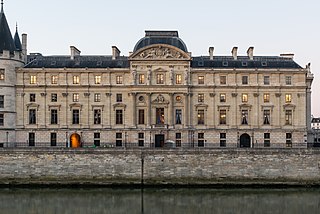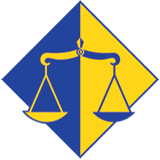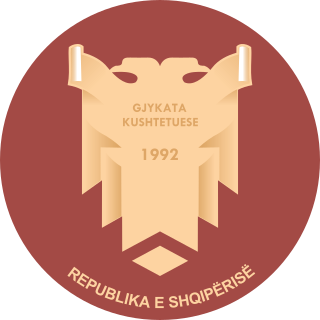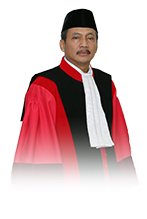
The Court of Cassation is the supreme court for civil and criminal cases in France. It is one of the country's four apex courts, along with the Council of State, the Constitutional Council and the Jurisdictional Disputes Tribunal.

The Judicial Yuan is the judicial branch of the government of Taiwan. It runs a Constitutional Court and oversees all systems of courts of Taiwan, including ordinary courts like the supreme court, high courts, district courts as well as special courts like administrative courts and disciplinary courts. By Taiwanese law, the Judicial Yuan holds the following powers:
The judicial system of Ukraine is outlined in the 1996 Constitution of Ukraine. Before this there was no notion of judicial review nor any Supreme court since 1991's Ukrainian independence when it started being slowly restructured.

The Judiciary of Russia interprets and applies the law of Russia. It is defined under the Constitution and law with a hierarchical structure with the Constitutional Court and Supreme Court at the apex. The district courts are the primary criminal trial courts, and the regional courts are the primary appellate courts. The judiciary is governed by the All-Russian Congress of Judges and its Council of Judges, and its management is aided by the Judicial Department of the Supreme Court, the Judicial Qualification Collegia, and the Ministry of Justice, and the various courts' chairpersons. And although there are many officers of the court, including jurors, the Prosecutor General remains the most powerful component of the Russian judicial system.

The judicial system of Turkey is defined by Articles 138 to 160 of the Constitution of Turkey.

The Supreme Court of Korea is the highest ordinary court in the judicial branch of South Korea, seated in Seocho, Seoul. Established under Chapter 5 of the Constitution of South Korea, the Court has ultimate and comprehensive jurisdiction over all cases except those cases falling under the jurisdiction of the Constitutional Court of Korea. It consists of fourteen Justices, including the Chief Justice of the Supreme Court of Korea. The Supreme Court is at the top of the hierarchy of all ordinary courts in South Korea, and traditionally represented the conventional judiciary of South Korea. The Supreme Court has equivalent status as one of the two highest courts in South Korea. The other is the Constitutional Court of Korea.

The Consolidation of the Justice System in Albania (EURALIUS) was an EU funded technical assistance project that sought the strengthening of the Albanian Justice System. The objective of EURALIUS was to strengthen the independence, transparency, efficiency, accountability and public trust in the Albanian justice system in line with the EU Acquis and best practices. EURALIUS was composed of long-term international experts from various EU Member States and of Albanian legal professionals who act as national experts, as well as support staff consisting of project assistants, translators, etc.

The High Judicial and Prosecutorial Council of Bosnia and Herzegovina is the national council of the judiciary of Bosnia and Herzegovina. It is the self-regulatory body of the judiciary in the country, tasked with guaranteeing its independence, with countrywide competences over the administration and career management of judicial office holders. It is based on the continental tradition of self-management of the judiciary.

The Supreme Court of the Republic of Indonesia is the independent judicial arm of the state. It maintains a system of courts and sits above the other courts and is the final court of appeal. It can also re-examine cases if new evidence emerges.

The Constitutional Court of the Republic of Albania is the highest authority in Albania's legal system that defends and assures the respect of the Constitution of Albania.

The Supreme Court of the Republic of Albania is the highest court of Albania and is the final court of appeals in the country's judicial system. It is composed of seventeen judges: the Chief Justice and sixteen Members.
Part Eighteen of the Constitution of Albania is the last of eighteen parts. Titled Transitory and Final Dispositions, it consists of 8 articles.
Part Nine of the Constitution of Albania is the ninth of eighteen parts. Titled The Courts, it consists of 22 articles including the Article 144 which was repealed in 2016. Together with Part Eight (Constitutional Court), and Part Ten (The Office of the Prosecutor) underwent radical changes in 2016 during the so-called Justice Reform, which were the efforts of lawmakers to fight corruption, organized crime, nepotism in the justice system.
Anahit A. Manasyan, Armenian lawyer. Human Rights Defender of Armenia.
The Judiciary of Kosovo is the collection of the central Kosovo institutions that exercises judicial authority in Kosovo. According to the 2008 Constitution of Kosovo, the judicial system is composed of the Supreme Court and subordinate courts, a Constitutional Court, and an independent prosecutorial institution. The courts are administered by the Kosovo Judicial Council.

The National Judicial Appointments Commission (NJAC) was a proposed body which would have been responsible for the recruitment, appointment and transfer of judicial officers, legal officers and legal employees under the government of India and in all state governments of India. The commission was established by amending the Constitution of India through the 99th constitution amendment with the Constitution (Ninety-Ninth Amendment) Act, 2014 or 99th Constitutional Amendment Act-2014 passed by the Lok Sabha on 13 August 2014 and by the Rajya Sabha on 14 August 2014. The NJAC would have replaced the collegium system for the appointment of judges as invoked by the Supreme court via judicial fiat by a new system. Along with the Constitution Amendment Act, the National Judicial Appointments Commission Act, 2014, was also passed by the Parliament of India to regulate the functions of the National Judicial Appointments Commission. The NJAC Bill and the Constitutional Amendment Bill, was ratified by 16 of the state legislatures in India, and subsequently assented by the President of India Pranab Mukherjee on 31 December 2014. The NJAC Act and the Constitutional Amendment Act came into force from 13 April 2015.

The chief justice of the Constitutional Court of Indonesia is the head of the Constitutional Court of Indonesia.

The Special Appellate College (KPA) (Albanian: Kolegji i Posaçëm i Apelimit) is an independent institution that is constitutionally tasked to oversee the transitional reassessment of judges and prosecutors in the Republic of Albania.

The National Board of Justice, formerly the National Council of the Magistrature, is an autonomous constitutional institution that is part of the Republic of Peru. Its primary function is to appoint and ratify all judges and prosecutors in the Peruvian justice system as well as to remove those that fail to fulfill their responsibilities.
Part Ten of the Constitution of Albania is the tenth of eighteen parts. Titled The Office of the Prosecutor, it consists of 13 articles. Together with Part Eight (Constitutional Court), and Part Nine (The Courts) underwent radical changes in 2016 during the so-called Justice Reform, which were the efforts of lawmakers to fight corruption, organized crime, nepotism in the justice system.















